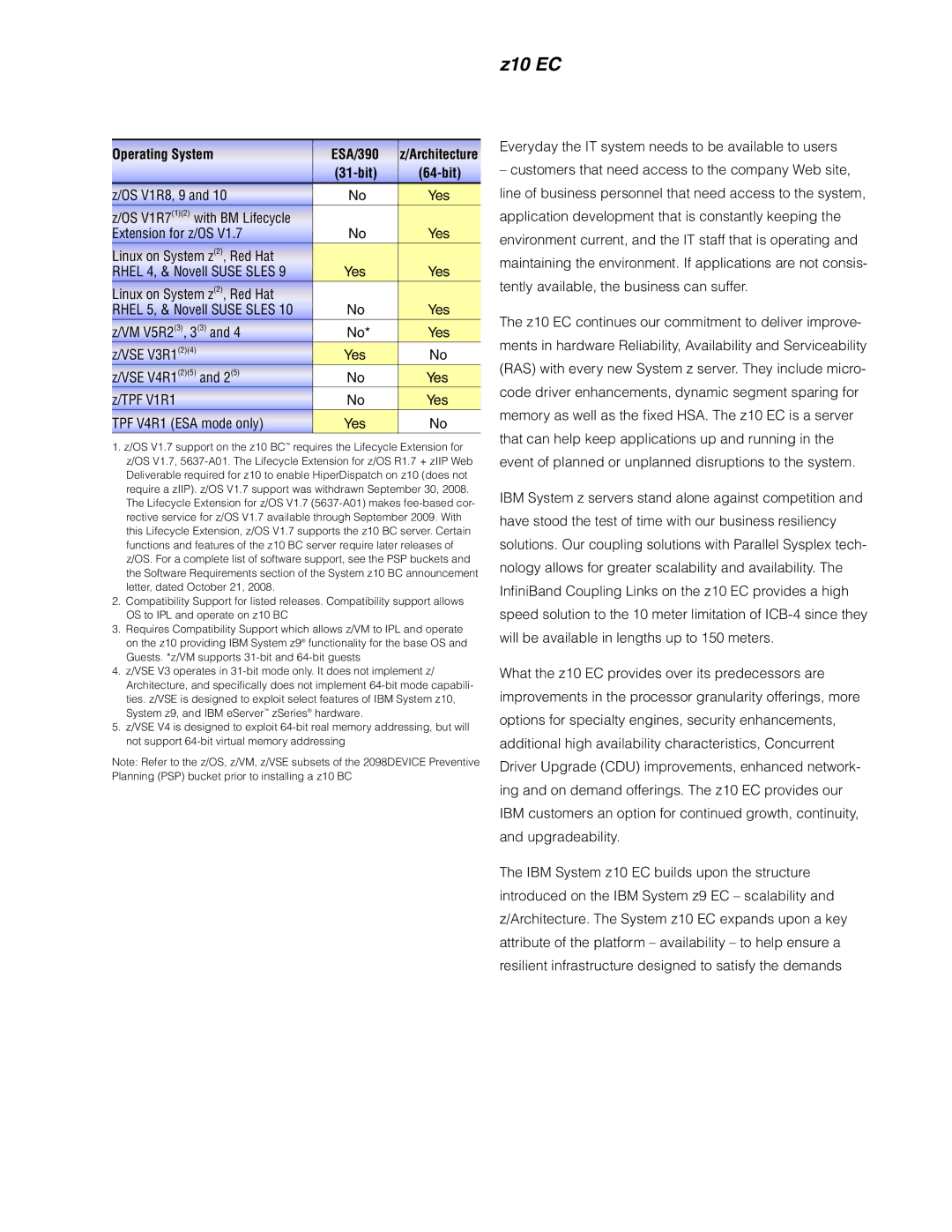
z10 EC
Operating System | ESA/390 | z/Architecture |
| ||
z/OS V1R8, 9 and 10 | No | Yes |
z/OS V1R7(1)(2) with BM Lifecycle |
|
|
Extension for z/OS V1.7 | No | Yes |
Linux on System z(2), Red Hat |
|
|
RHEL 4, & Novell SUSE SLES 9 | Yes | Yes |
Linux on System z(2), Red Hat |
|
|
RHEL 5, & Novell SUSE SLES 10 | No | Yes |
z/VM V5R2(3), 3(3) and 4 | No* | Yes |
z/VSE V3R1(2)(4) | Yes | No |
z/VSE V4R1(2)(5) and 2(5) | No | Yes |
z/TPF V1R1 | No | Yes |
TPF V4R1 (ESA mode only) | Yes | No |
1.z/OS V1.7 support on the z10 BC™ requires the Lifecycle Extension for z/OS V1.7,
2.Compatibility Support for listed releases. Compatibility support allows OS to IPL and operate on z10 BC
3.Requires Compatibility Support which allows z/VM to IPL and operate on the z10 providing IBM System z9® functionality for the base OS and Guests. *z/VM supports
4.z/VSE V3 operates in
5.z/VSE V4 is designed to exploit
Note: Refer to the z/OS, z/VM, z/VSE subsets of the 2098DEVICE Preventive Planning (PSP) bucket prior to installing a z10 BC
Everyday the IT system needs to be available to users
–customers that need access to the company Web site, line of business personnel that need access to the system, application development that is constantly keeping the environment current, and the IT staff that is operating and maintaining the environment. If applications are not consis- tently available, the business can suffer.
The z10 EC continues our commitment to deliver improve- ments in hardware Reliability, Availability and Serviceability (RAS) with every new System z server. They include micro- code driver enhancements, dynamic segment sparing for memory as well as the fi xed HSA. The z10 EC is a server that can help keep applications up and running in the event of planned or unplanned disruptions to the system.
IBM System z servers stand alone against competition and have stood the test of time with our business resiliency solutions. Our coupling solutions with Parallel Sysplex tech- nology allows for greater scalability and availability. The Infi niBand Coupling Links on the z10 EC provides a high speed solution to the 10 meter limitation of
What the z10 EC provides over its predecessors are improvements in the processor granularity offerings, more options for specialty engines, security enhancements, additional high availability characteristics, Concurrent Driver Upgrade (CDU) improvements, enhanced network- ing and on demand offerings. The z10 EC provides our IBM customers an option for continued growth, continuity, and upgradeability.
The IBM System z10 EC builds upon the structure introduced on the IBM System z9 EC – scalability and z/Architecture. The System z10 EC expands upon a key attribute of the platform – availability – to help ensure a resilient infrastructure designed to satisfy the demands
